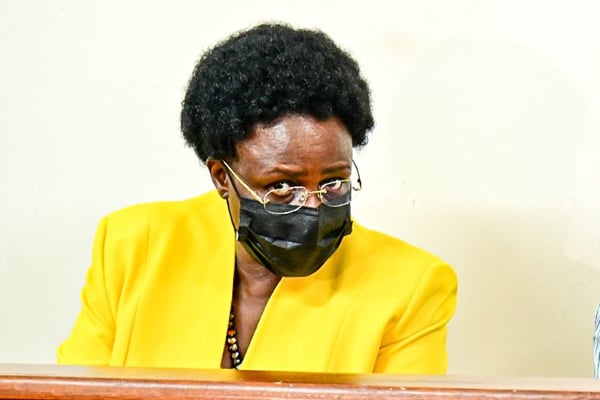By Steven Masiga
Recently while speaking to her electorate during some belated Women”s Day celebration in Namisindwa district, Karamoja minister, Mary Goretti Kitutu who has been implicated in the erroneous distribution of karachuna iron sheets made some statements that some of us can’t let go of just like that.
She openly told her audience made up of mostly upcountry women who are least concerned with matters of law that President Museveni cannot sack her.
Of course, it is trite law that an accused person is presumed innocent until proven otherwise, and that is why many legal minds insist that you would rather release 99 condemned prisoners than convict one innocent person. Innocence is both a constitutional and core directive under natural law and common law.
And no person or court can strike it down. But since this is an ongoing court matter, Kitutu should not have made such disturbing statements which appeared to insinuate that the state was persecuting her or she was a victim of some sort from comrades and her enemies in government and beyond.
Both municipal law and international law have the same message on principles of innocence on all accused persons in criminal matters.
For example, the ICC statute in Article 66(1) states firmly on the presumption of innocence that “Every person shall be presumed innocent until proven guilty before a competent court and in accordance with the applicable law.
And further, in article 66(2), the onus of proving the guilt of the accused is placed on the prosecution and in this case the state.
For example, in Uganda, under the Evidence Act cap 6, the burden to prove the guilt of the accused is placed on the prosecution who claim that so and so committed a crime and the authority in sections 101 and 106 is quite instructive and must be followed at times in criminal trials.
The Ugandan constitution on its part has ‘thousands’ of rights available to all accused persons in criminal matters and that was the basis upon which courts of law were based to grant bail to Hon Kitutu and others in a similar category.
For example, Article 23(6) enjoins the court to grant bail to an accused person based on its own volition.
Even an ordinary student of an administrative law course at Makerere University can be able to strike out a difference between a conviction and a trial.
Legally, once one is accused of committing a crime it does not imply that they are already guilty as charged.
Since being charged, there are a series of stages in between like the freedom to bail (refer to Art 23 in its wholeness) before a conviction can be secured or an acquittal for that matter, if there is insufficient evidence.
One of the core reasons behind a criminal trial is either to convict the accused person based on the overwhelming evidence presented before court or an acquittal of the accused once there is insufficient evidence.
It is therefore politically wrong for a lawmaker to skip these useful pieces of legislation which even bear her own input to tell the whole world that the president cannot sack her.
A President can relieve his ministers of their responsibilities based on many parameters.
One can even be proven by the court as innocent but still loses his or her political battle of retaining their ministerial positions; there are indeed many factors at play.
It is trite law in Uganda and elsewhere based on the above reasons that the president cannot infer guilt of an accused person until courts pronounce themselves on the same.
Article 28 which emphasizes the right to a fair trial also outlines several rights available to all accused persons which include innocence and access to a lawyer of one’s choice among other many such rights.
While presiding over the women’s day celebrations Kitutu openly castigated those claiming that she can steal iron sheets “Me a full minister to steal iron sheets” she cried out, and she was quick to remind her audience that she has a very big budget.
The late Kivejinja Kirunda and others like Sam Kutesa and Jim Muhwezi too had such a budget but were implicated in the mismanagement of their ministries and lost their ministries.
For example, Kivejinja’s diversion of just 200 litres which was less than 10,000,000m shs cost him.
The penal code says once one is found with even one piece of iron sheet or any other thing belonging to the government, he or she will be held for being in possession of government stores illegally.
Many pundits posit that theft or diversion of iron sheets may be attributable to the absence of an enabling policy within the OPM on who is supposed to distribute iron sheets after funds were acquired for them.
At some point in time, thousands of tailoring machines were also found in Tororo belonging to some senior officials in the office of OPM.
The office of the prime minister has a rich history of mismanaging items meant for the wanainchi. Thus a substantive policy is required so that in the future such scenarios do not occur again.
In policy formulation, policymakers should be different from policy executors. That dichotomy should not be abused, cautioned Woodrow Wilson at one time as an American president.
Therefore, technocrats and ministers should devise a policy on how such items should be distributed to the intended communities as opposed to a policy of sharing them.
Ordinarily, ministers do the planning and technocrats do the distribution under the watchful eyes of the very ministers or call it oversight monitoring.
The writer is an author and administrator from Mbale. Tel: 0706655811.
If you would like your article/opinion to be published on Uganda’s most authoritative news platform, send your submission on: [email protected]. You can also follow DailyExpress on WhatsApp and on Twitter (X) for realtime updates.



